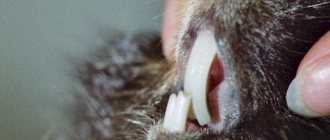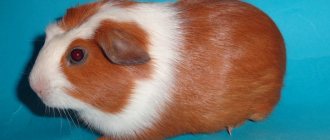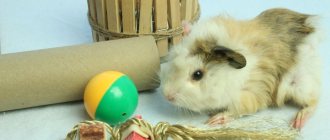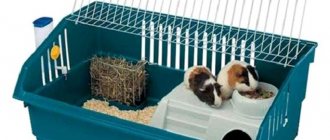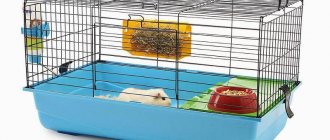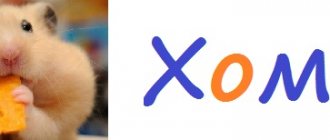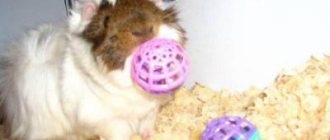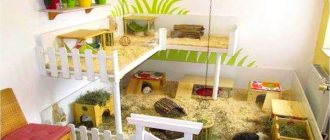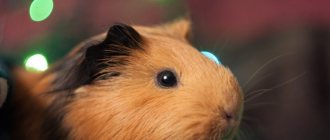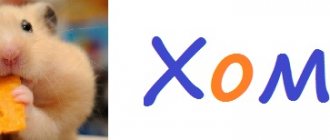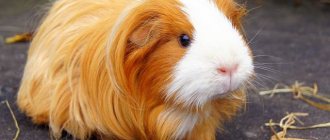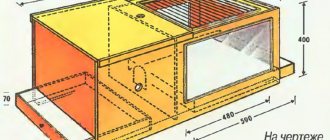Brittle teeth in guinea pigs are a natural phenomenon. Partially or even completely broken incisors grow back in 2-3 weeks. True, while they are growing, the animal may experience pain and discomfort when eating solid food. The animal will eat hay and grass without any problems, but it will have to grate root vegetables. In addition, grain and dry food should be excluded from the pet’s diet during this period.
A more unpleasant problem is the chipping of the cutter. Your pig's chipped teeth will wear down unevenly unless you contact your veterinarian for artificial grinding.
Dental problems in guinea pigs are not uncommon. These animals are characterized by malocclusion, dental diseases, falling out teeth, broken teeth, and inflammation of the mucous membrane. All this causes concern among owners. However, not all of the above problems lead to sad consequences, some are easily solved, and some even go away on their own.
How many teeth does a guinea pig have?
All pigs, regardless of species and breeds, have the same jaw structure. You need to know that the number of teeth of a guinea pig is 20. They have the peculiarity of constantly growing. Their length is corrected by the ability to constantly gnaw or chew something. Constant growth and their correction inherent in nature allows the animal to keep its teeth, otherwise it would not have them after a year of life. They do not have a constant length. The shape of the top edge changes. It all depends on the food he eats. If everything is chosen rationally, there is no need to worry. Their length will adjust on its own.
What to do first
Problems with the incisors are easy to spot, but don't try to open your pig's mouth wide and look inside to inspect the rest of the teeth. Most likely, you will simply scare the animal, or in the worst case, you will also introduce bacteria into the mouth. It is very difficult to properly restrain a rodent at home.
Of course, we recommend that you first contact a ratologist (that’s what a veterinarian who specializes in rodents is called). Guinea pigs are weak creatures, and sometimes delaying a few days can be a fatal mistake.
Don’t worry, we will still tell you about some problems and their treatment.
Structures of the jaws and teeth of a guinea pig
The incisors are large, the lower front teeth are always larger, and the upper ones are smaller. The lower incisors are slightly convex, the upper front ones are slightly concave. The incisors should not close together. This indicates that the bite is correct and there is space vertically and horizontally. The outer side of the front teeth is covered with enamel. It is not on the inner surface and erasing is much faster. Incisors increase the cutting surface. The cheek teeth are slightly tuberous. They do not have roots as such. This feature promotes the constant growth of crowns and roots - reserve crowns.
The lower jaw moves in all directions according to the principle of a knife. After all, solid food needs to be cut into small pieces, which the pig does by biting off the required portion with the upper jaw.
Normal dental condition
- It is considered normal if the lower incisors are about 1 cm long, the upper ones should always be shorter - 0.6-0.7 cm. Keep an eye on these parameters.
- There should be gaps between the incisors vertically and horizontally; they should not overlap.
- The lower jaw extends under the upper jaw by 2-3 mm.
- Erasure and regrowth proceed evenly.
Remember! With a balanced diet, the pig feels well, the front teeth are ground down to the required level while eating. No veterinary intervention is needed.
Symptoms of dental disease in guinea pigs
- Unusual chewing, spitting out food or as if it is going up;
- when chewing, the ears move strongly;
- saliva flows, which may contain blood due to damage to the gums, the fur around the mouth is wet;
- chews on one side and slowly, unchewed pieces fall from the mouth;
- Chews hard food longer than soft food;
- the incisors are inclined to one side, the upper ones protrude from the mouth;
- the ears and nose are full of mucus that flows, there are tears in the eyes, they swell, the eyeball enlarges, because the soft tissues near the eyes and nasal sinuses can be injured by teeth growing into them, the animal’s muzzle is distorted due to upper or mandibular abscesses;
- She has lost weight, doesn’t eat food, only sniffs.
Symptoms
Alarm signals indicating the presence of a problem are changes in the behavior of the guinea pig and the nature of physiological functions:
- weight loss
- refusal to eat
- increased salivation (the animal “chomps” while eating), drooling
- inability to chew food normally (the animal drops pieces from the mouth)
- diarrhea (due to inability to chew hay and choosing soft foods)
- tearing while eating (because it hurts to chew)
- Lack of bowel movements or irregular bowel movements due to malnutrition
- increasing the duration of food intake (chews slower than usual)
Usually, all this indicates that a malocclusion has formed and the mumps needs urgent medical attention. If emergency treatment is not possible and your pet is unable to eat and is losing weight, you can feed him liquid food. To do this, feed granules need to be soaked in water until they become a paste. You can use a syringe for feeding, from which the part near the “spout” is cut off so that only the tube and the piston remain. This way you will save him from starvation.
Tooth loss
Tooth loss is also natural for pigs, as is brittle teeth. As a rule, a new one grows in place of the lost tooth (after 2-3 weeks).
A small problem for the animal is a loose tooth. But even here the pig does not experience much discomfort. You can wait until the tooth falls out on its own, or you can carefully pull it out.
To prevent tooth fragility and tooth loss, veterinarians recommend giving guinea pigs more foods rich in calcium and additionally feeding them with an ascorbic acid solution.
Causes of dental problems
They don't have caries. But they can have malocclusion, just like people. This happens from a genetic mutation. Therefore, if you plan to breed pigs, do not mate relatives.
Pigs have dental problems. The causes of the disease are different: they crumble and break when they chew on their cage. This happens when there are no solid foods in the diet that allow them to be undermined. Food that is easily chewed aggravates the problem of incisor growth; natural grinding is disrupted, they grow unevenly, grow much longer than normal, cut into the mucous membrane of the cheeks, provoking inflammation.
The bite affects the lengthening of the front teeth, or incisors along with the lateral ones. Then it is difficult to eat, and her health worsens.
If they grow larger than normal, they can injure the mouth by growing into the cheeks or tongue.
Remember! Sometimes they seem very large, but this may be an individual feature and has nothing to do with malocclusion.
Please note: when an animal falls, the teeth can become dislodged and injure the mucous or soft tissues of the mouth. Sometimes they wear down so quickly that they don't have time to grow. This is the reason for the lack of vitamin C. If they break or crumble, there is not enough calcium. Fast-growing roots indicate that the animal is eating green grass or hay that has been treated with herbicides. They contain fluoride, which is not quickly removed from the body and leads to lengthening of tooth roots. Old age may also cause them to shift, and then you will have to syringe-feed them liquid food for the rest of your days.
If multiple symptoms are present, diagnosis is much quicker. You need to contact a veterinarian who will examine the oral cavity and take an x-ray of the jaw. If there are pain symptoms, general anesthesia will be given.
Symptoms of dental diseases
When problems with teeth appear, the general condition of the pet worsens. She loses her appetite, loses weight, and over time her body becomes exhausted.
This can even lead to death, so you need to notice the symptoms of diseases of the dental system in time:
- difficulty swallowing food;
- excessive salivation (hypersalivation);
- refusal of solid food that falls out of the mouth; the animal can also spit it out;
- chewing load on one side of the jaws;
- constant movement of the ears while eating;
- grinding or chattering of teeth;
- inability to completely close your mouth;
- diarrhea or constipation due to improper chewing or swallowing of food;
- incorrect placement of the incisors, protruding them in different directions, grinding at a certain angle;
- the appearance of blood in saliva;
- sores or fistulas in the mouth;
- swelling in the cheek area (abscess or neoplasm);
- loose teeth;
- copious discharge from the nose or eyes.
While chewing food, a guinea pig makes a sound that is similar to a cough; it puts its paws in its mouth in an attempt to get out hard pieces. While chewing, the teeth creak, dark spots and bevels appear on the incisors, they are very long, crumble, bend inward or diverge to the sides.
Weight is steadily decreasing, which can be determined by regular weighing. The fur on the neck becomes wet due to excess saliva production. Sometimes you can hear something gurgling or wheezing in the nasopharynx. Stools are unshaped, irregular or small, indicating malnutrition.
If such problems occur, you should take your pet to the veterinarian.
Important! The front teeth are considered healthy if they are white and have even edges. If their ends are beveled, then this indicates problems.
Dental pathologies in guinea pigs
Injuries
When it falls, teeth can break without damaging the crown. They get injured when they chew on the iron bars of a cage without branches. Make sure that the oral mucosa is not injured by them on the opposite side, so that stomatitis does not develop.
Inflammation and suppuration occur if the gums bleed, touched by the uneven sharp edges of a broken tooth, which continues to crumble and there is a threat of its complete loss. A visit to the veterinarian is necessary to solve problems:
- their pruning;
- broken upper teeth;
- there is an unpleasant odor from the mouth.
Using special bone forceps and under anesthesia, the doctor will smooth out sharp irregularities. After the procedures, you cannot eat. For feeding, use a syringe without a needle, filling it with grated vegetables. Soft food and calcium a quarter or 1/3 tablet, and vitamin C must be given for at least the first fourteen days.
Adding vitamins to food will stop them from wobbling and crumbling.
Sometimes the pig knocks its teeth on the metal bars of the cage, and there is a danger of breaking them or the jaw. To prevent their damage and weakness, you need to review your diet by adding vitamins C and D.
The reason for the knocking may be the elongation of the incisors and she wants to reduce them, and using the capabilities that she has, she grinds them down. She may also feel discomfort or pain in the abdominal area and pound, wanting to get rid of it. Knocking may indicate her dissatisfaction.
When there are no sharp ends in the broken tooth, there is no need to bother the veterinarian. Give a quarter of a 100 mg vitamin C tablet every day.
When your guinea pig grinds its teeth, you should watch it. The reason may be dissatisfaction, pain, infection, or difficulty eating. Weigh her every week and if her body weight decreases and the grinding does not stop, you need to go to the vet.
When a pig clicks its teeth, it doesn't like something at all, it's scared or angry.
Cheilitis
Pigs suffer from cheilitis. The disease affects the gums and oral mucosa, where cracks form. Hard deposits appear around the tooth roots, which are formed from yellowish or brown plaque that accumulates between them. The teeth diverge to the sides.
The main causes of infection can be a virus, a fungus, from food, an allergy to dust that is in the hay, upon contact, from an excess of vitamins or from a lack of pantothenic acid, vitamins A and C, when the diet is unbalanced.
There are two options for treating dental cheilitis: nutrition and medication.
It is necessary to reconsider the composition and standards of nutrition. Do not give sour and sweet and sour fruits and vegetables for some time. Give preference to twigs, dry herbs, and vegetables that have almost no juice. To ensure that your food contains various vitamins, give 3-4 pieces of peeled sunflower seeds, half a teaspoon of flax seeds. Moisten the food with drops of sesame oil.
Teeth trimming at home around the clock
Teeth trimming is a painful procedure and is therefore most often performed under anesthesia.
Experienced ratologists perform it both in a veterinary clinic and at home. In some cases, when anesthesia is contraindicated, the doctor acts without it, using special tools, acting quickly and accurately.
It is important to choose the right length - do not cut the teeth too short, otherwise the pet will not be able to feed on its own.
In this regard, you should not try to trim the teeth yourself - this can lead to serious health problems for the animal.
Do not trust instructions on the Internet - contact our veterinary center to receive qualified care in the hospital and at home.
Prevention of dental diseases
Carrying out preventive measures provides a solution to some problems:
- The presence of a diet with a predominance of solid feed, grain and hay. Give soft food and various delicacies in small doses. You cannot feed with the same products that you buy for yourself.
- When purchasing animals, check for congenital diseases.
- When setting up the cage, follow the rules to avoid falls and injuries.
- Do not keep two aggressive pigs in one cage.
- For pregnant females and young animals, enrich the diet with foods containing potassium and vitamins C and D.
- To be sure that the pig is not losing weight, weigh it once every 7 days.
- If you notice a reluctance to eat, increased salivation, or weight loss, you should contact a veterinarian.
In case of malocclusion and long roots, a tight elastic bandage applied at night helps. It compresses the jaw, the rodent resists, and as a result the muscles become stronger. The teeth they clenched begin to wear down. If this does not happen, you should contact your veterinarian to have the teeth filed and a bandage applied. After correction, the growth of incisors and molars becomes normal.
Your veterinarian will tell you how long to wear the bandage. In addition, a light jaw massage is prescribed for about 1.5 - 2 minutes on each side.
How to help your pet with its dental problems at home? Try to grab the broken tooth with your fingers and pull it out. The pig will survive this trouble. It hurts her more when it catches her gum and it starts to bleed. Don't be afraid, you won't be able to pull out the healthy one - it sits tightly, but the broken one will come out easily. The wound should be smeared with iodine. For some time the pig may not eat even soft food, then you can give it food using a syringe: 6 grams per 100 g of weight.
Who is at risk?
The prerequisites for the development of pathologies are the structural features of the teeth. In rodents they are aradicular, characterized by lifelong growth, and do not have a true root or apex.
Pets – rodents and lagomorphs – are prone to dental problems. Oral diseases are usually associated with excessive growth of incisors and molars. If it is not possible to constantly sharpen them, then they injure the gums, adjacent teeth and periosteum. Often, with a severely advanced problem, the incisors can pierce right through the skull.
When do you need veterinary help?
Contact a specialist with any questions regarding the condition of our little brothers. It is better to get professional advice in time and quickly begin treatment in order to help your pet as quickly as possible. In some cases, a visit to the veterinarian must be urgent. This depends on the condition of the guinea pig and the problem discovered by the owner.
For dental trauma
If the tooth is only slightly chipped, its edge is not too sharp, you don’t have to disturb the rodent, everything will grow back in 1-2 weeks. Just make sure your pig is eating normally and not losing weight. Also make sure that the remaining teeth do not injure the opposite cheek and gum.
But if the fragment is uneven, the tooth is broken too much or broken completely, visit the veterinarian. He will be able to provide the following assistance:
- Wash the wound in the gum with a saline solution (1 teaspoon of table salt per ½ liter of water) and teach you how to do this for independent use at home;
- grinds down the sharp edge of a broken tooth;
- will shorten other teeth so that they do not injure the oral cavity.
When extending roots
In rodents, tooth roots that are longer than normal cannot be externally determined. But they can cause malnutrition, and as a result, weight loss in the guinea pig. If you notice that your animal has lost weight, take it to the vet immediately. If no other cause of exhaustion is found, this assumption should be checked with x-rays.
If the elongation of the roots is confirmed in the image, you will need dental treatment (grinding) and an elastic bandage on the jaw.
Meet the terrible beast cheilitis
What is this?
Cheilitis is darkening of the lips and cracks in the mouth, the appearance of brown, green or yellow plaque on the teeth.
www.guineapigcages.com
This is a common disease that occurs as a result of stress, improper living conditions and a poor diet. Many people believe that cheilitis occurs due to an excess of succulent food in the diet, but this is not so.
You can’t do without juice, but excess sugar is really dangerous. This is why pigs should not be fed apples, tomatoes, or large amounts of grain every day.
How to treat?
Do not under any circumstances pick up the sore, it will definitely appear again.
To treat your lips, use an antifungal agent. Both ointments for people (Candide, Clotrimazole) and veterinary medications (Panolog, Surolan) are suitable. Before application, use an antiseptic (for example, Chlorhexidine, chamomile solution). Apply a thin layer of ointment to the pig's lips, 2-3 times a day for 10-14 days, until complete healing.
When treating teeth, you should not use ointments for external use. “Candide for the oral cavity” (for people) does a good job. Apply the product to a cotton swab and gently anoint your teeth.
During treatment, exclude fruits, tomatoes, cucumbers and citrus fruits from the pig's diet.
